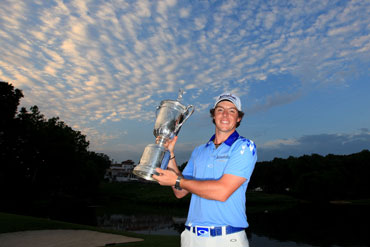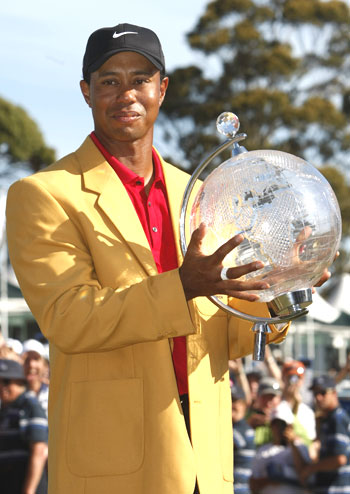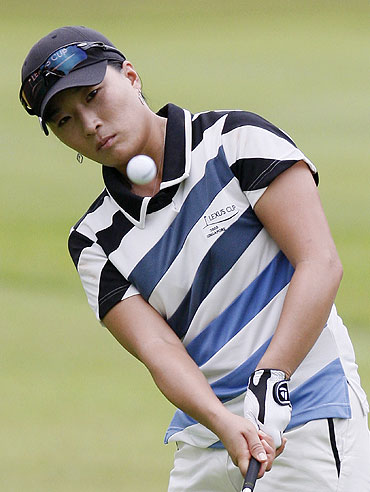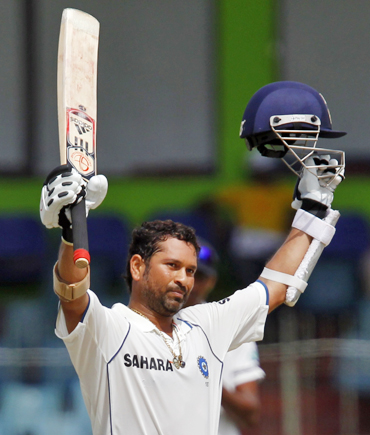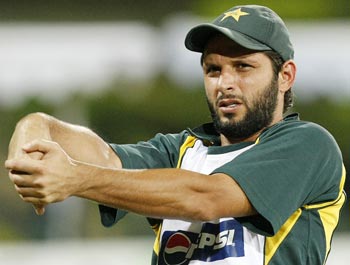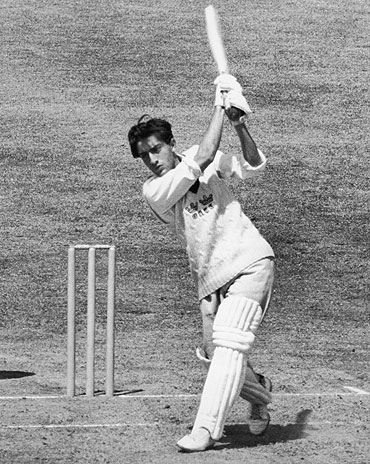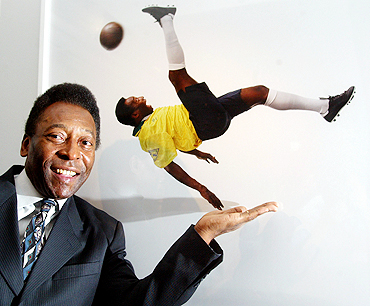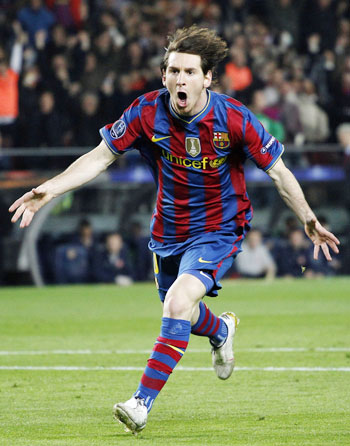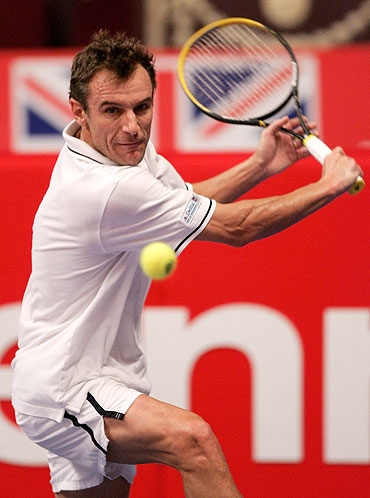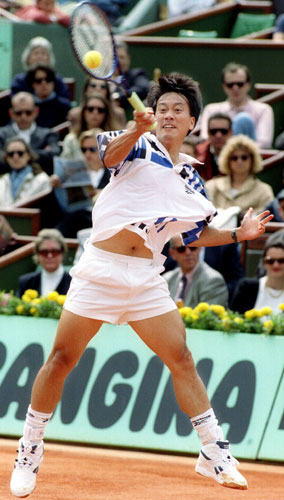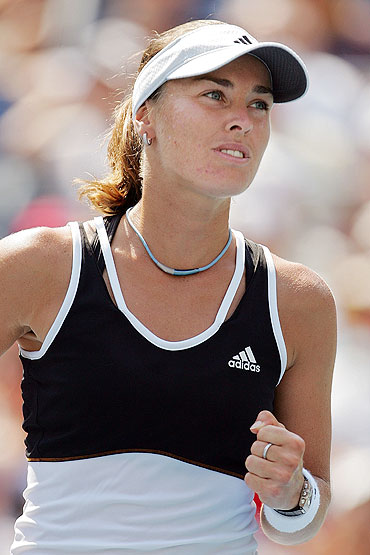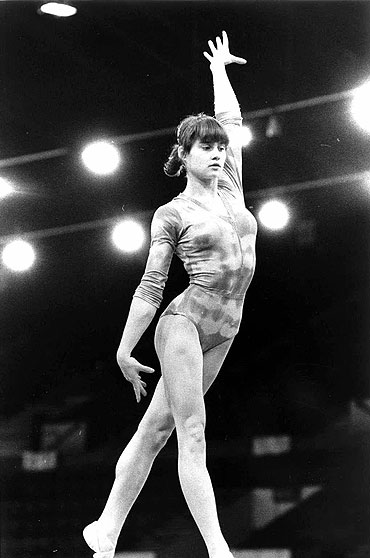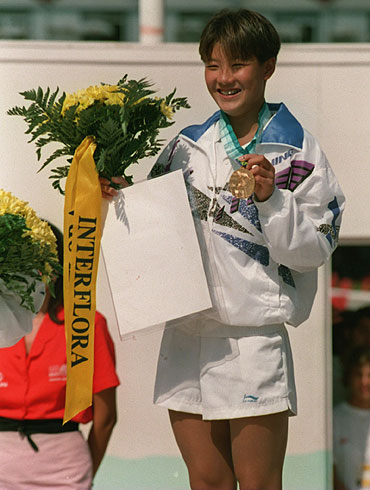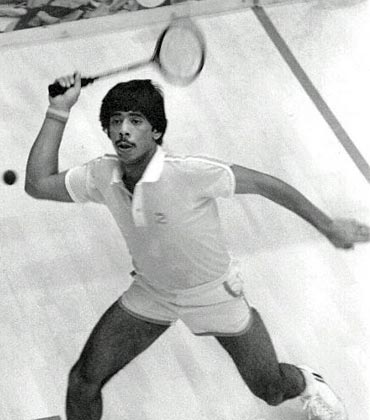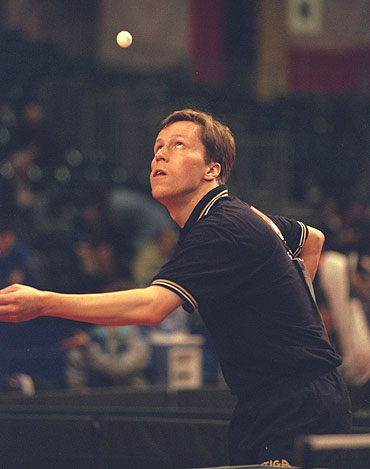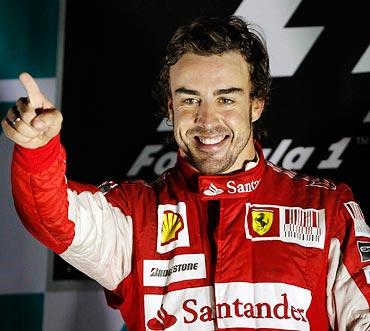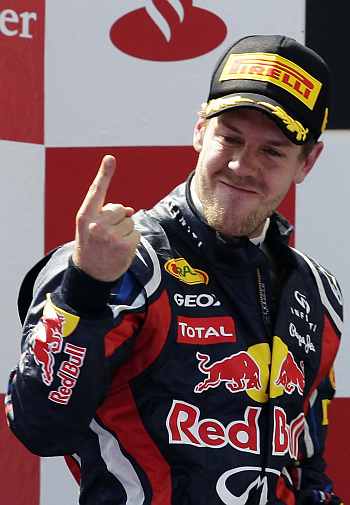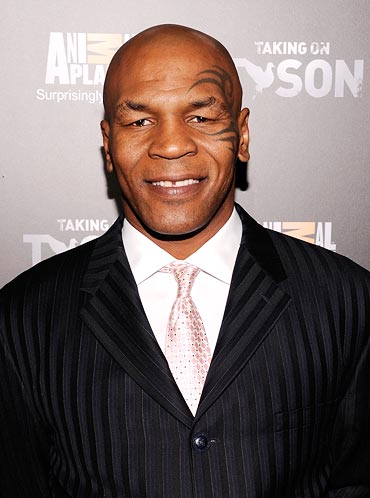 | « Back to article | Print this article |
Rory McIlroy
Golfer Rory McIlroy won the US Open by eight shots in record style on Sunday, confirming his rich promise as a potential golfing great by becoming the championship's youngest winner since 1923.
At the age of 22, the mop-haired Northern Irishman clinched his first major title by an astonishing eight shots, raising comparisons with the record 15-shot margin achieved by Tiger Woods at the 2000 US Open.
Bikash Mohapatra takes a look at a few athletes who made a mark at an early age.
Tiger Woods
Continuing with golf, we move on to describe arguably the greatest golfer ever.
Tiger Woods arrived with a bang on the international stage in April 1997. A record score of 18 under par helped him win the Augusta Masters by a record margin of 12 strokes.
That made the American the tournament's youngest-ever winner.
Two months later, in only his 42nd week as a professional, he became the world's No.1 golfer, the fastest to achieve the feat.
Since then Woods won 14 major championships and, in the process, became the youngest player to achieve the career Grand Slam.
At 35, he is second in the list of career majors (behind Jack Nicklaus's 18), and with 71 PGA Tour wins is third in the all-time list behind Sam Snead (82) and Nicklaus (73).
Se Ri Pak
A success story, at just 20.
In 1998, Se Ri Pak became the youngest-ever winner of the US women's Open, beating American Jenny Chuasiriporn in a 20-hole play-off.
That win marked the start of a prolific career for the South Korean.
She went on to win 25 tournaments on the LPGA Tour, including four more majors the LPGA Championship titles thrice in 1998, 2002 and 2006 and the Women's British Open in 2001.
In June 2007, she was included in the World Golf Hall of Fame, thereby becoming, at 29, the youngest entrant ever, surpassing Australian Karrie Webb.
Sachin Tendulkar
Records have become synonymous with Sachin Tendulkar over the years.
Having made his debut at just 16 years of age, against Pakistan, Tendulkar created history on his subsequent tour.
An unbeaten 119 at Old Trafford (Manchester) made him, at 17 years, 107 days, the second youngest cricketer to score a Test century behind Pakistan's Mushtaq Mohammad (17 years, 78 days).
(Bangladesh batsman Mohammad Ashraful has since become the youngest Test centurion, at 17 years, 61 days, with his 114 against Sri Lanka in Colombo in September 2001.)
Today, the Master Blaster, like we said at the beginning, has his name alongside almost every record.
Shahid Afridi
He didn't get to bat in his first one-dayer. However, in his second ODI, Shahid Afridi created history.
At 16 years and 217 days, Afridi became the youngest player to score a one-day hundred.
Playing what was his first international innings, the flamboyant Pakistani batsman broke the record for the fastest century in one-day cricket, scoring a 37-ball hundred against Sri Lanka.
His 102 was a match-winning effort and inclusive of 11 sixes -- a record since broken by West Indies' Xavier Marshall.
Mansur Ali Khan Pataudi
Mansur Ali Khan Pataudi, popularly known as Tiger, was the youngest cricketer ever to captain the Indian team. He was promoted to the post at the age of 21 in 1962.
Under his able leadership India went on to register their first overseas Test victory, when they crushed New Zealand in 1967.
Pele
On his international debut (July 7, 1957), Pele scored his maiden goal, thereby becoming the youngest player (at 16 years and nine months) to score.
The following year, he became the youngest player to play in the World Cup. His match-winner against Wales made him the youngest (at 17 years and 239 days) to score a goal in the World Cup.
In the next match, against France, Pele became the youngest player in World Cup history to score a hat-trick, while his two goals in the final against hosts Sweden (Brazil won 5-2) also made him the youngest player to play and score in a World Cup final.
The rest, as they say, is history.
Lionel Messi
Arguably the best player of this generation, Lionel Messi holds a plethora of records.
When the then coach Frank Rijkaard handed him his league debut for Barcelona, against Espanyol in October 2004, it made the Argentine the third-youngest player ever to play for the Nou Camp club and youngest club player to play in Primera Liga.
His first goal against Albacete made him the youngest Barca player (at 17 years and 114 days) to score a league goal; both the records were subsequently broken by Bojan Krkic.
More records followed, and today, three days short of his 24th birthday, Messi has thus far won five Spanish League (Primera Liga) titles, three Champions League titles and a host of other trophies.
Wayne Rooney
Wayne Rooney became the youngest player to play for England when he first played in a friendly against Australia in 2003, at the age of seventeen.
He also became the youngest player to score an England goal at the same age. But that record was broken three years later. Arsenal's Theo Walcott broke Rooney's appearance record by 36 days in May 2006.
At Euro 2004 he became the youngest scorer in the history of the tournament when he netted twice against Switzerland.
However, this record was briefly held, broken by Swiss midfielder Johan Vonlanthen four days later.
Mats Wilander
In the 1982 French Open, a Swede, aged just 17 years and nine months, beat Ivan Lendl (seeded second), Vitas Gerulaitis (seeded fifth), Jose Luis Clerc (seeded fourth) and former champion Guillermo Vila (seeded third) to win his first major title.
The win made Mats Wilander the youngest player ever to win a major title (the record was subsequently broken by Boris Becker and then Michael Chang).
However, when Wilander won his second title in Roland Garros in 1985, he created another record that remains intact.
That triumph in Paris was Wilander's fourth major, at the age of just 20 years, making him the youngest male player to have won four major titles at that age.
Boris Becker
One of the most popular players to have set foot on a tennis court, Boris Becker remains the youngest-ever to win the men's singles title at Wimbledon.
A four-set win over Kevin Curren in 1985 made the German, at 17 years and seven months, the youngest-ever winner of the coveted grass court trophy. .
It also made him the first unseeded player and the first German to win the Wimbledon singles title.
The German was also the youngest ever male Grand Slam singles champion at the time, till Michael Chang took that honour by winning the French Open in 1989.
Michael Chang
The American surprised everyone, maybe even himself, by winning the French Open title in 1989.
Having shocked three-time winner Ivan Lendl in the fourth round, he eked out a five-set win over Stefan Edberg in the final to become, at 17 years and three months, the youngest male player to win a major singles.
Two months later, in August 1989, Chang became the youngest player to be ranked in the world's top-five.
He failed to win another major title in an otherwise illustrious career.
However, his lone record remains intact.
Martina Hingis
The 'Swiss Miss' set a plethora of records early on in her career.
A win the women's doubles at Wimbledon in 1996, partnering Czech Helena Sukova, made Hingis, at 15 years and nine months, the youngest Grand Slam winner of all time
A year later, Hingis won three of the four major titles and assumed the world No.1 ranking.
Her triumph at the Australian Open made the Swiss the youngest singles winner in the 20th century.
And, at Wimbledon that year, she became the youngest singles champion at the All England Club since Lottie Dod way back in 1887.
Nadia Comaneci
When just 13 years of age, Nadia Comaneci made the world sit up and notice her when she won, amongst others, the all-round gold at the 1975 European Championship in Skein (Norway).
A year later, the Romanian created history at the Montreal Olympics by becoming the first gymnast ever to be awarded a perfect score of 10.
In Montreal, Comaneci also became the youngest gymnast to win the all-around gold a record she will always hold as the age criteria has been revised since.
The Romanian gymnast won a total of five gold medals in Montreal and Moscow Olympics.
Fu Mingxia
For the record, the Chinese is the youngest World champion ever in any sport.
In her case, it is diving.
When Fu Mingxia won her first world title in 1991, at 12, she achieved the above-mentioned feat.
In the Barcelona Olympics in 1992, Fu, aged 13, became China's youngest Olympic champion ever when she won gold in the 10-metre platform. With the governing body altering the age rules (the limit for divers is now 14), Fu's record can't be broken.
Fu subsequently had an illustrious career, winning two gold medals at the Atlanta Olympics, 1996, and three other world titles.
Jahangir Khan
Jahangir Khan was born to win.
In 1981, the Pakistan squash player beat four-time champion Geoff Hunt of Australia to win his maiden world title.
That win made him, at 17, the youngest winner of a world title and marked the start of an unbeaten run that would last for five years and a whopping 555 matches.
When New Zealander Ross Norman upset Khan at the World Open final in Toulouse (France) in 1986, it marked the end of that wonderful streak.
Khan though bolstered his credentials by winning the World Open on six occasions and the coveted British Open a record ten times.
Jan-Ove Waldner
They call him the Mozart of table tennis.
Glimpses of Jan-Ove Waldner's potential were seen as early as 1982, when, as a 16-year-old, he reached the final of the European Championship.
The Swede had beaten compatriot and former world champion Stellan Bengtsson en route, and led countryman Mikael Appelgren 2-0.
Waldner lost the match but established his credentials.
The next year he won the prestigious European Top 12 for the first time in Bratislava.
At 22, he reached (and lost) the final of the World Championships in New Delhi to China's Jiang Jialiang. Two years later in Dortmund, Waldner became the world champion.
Fernando Alonso
The first big name to emerge from Spain in F1 history.
In 2003, Fernando Alonso became the youngest driver to achieve pole position at an F1 race -- the Malaysian Grand Prix.
A few months later, he became the youngest driver to win a Formula One race at the Hungarian Grand Prix.
Two years later, in 2005, the Spaniard, at 24 years and 59 days, became the youngest drivers' champion breaking Brazilian Emerson Fittipaldi's longstanding record.
All of the Spaniard's above-mentioned records have been bettered since. Save one.
In 2006, Alonso became world champion for a second time, thereby becoming the youngest double champion in F1 history. This one remains intact.
Sebastien Vettel
During the US Grand Prix in 2007, Sebastien Vettel (at 19 years and 53 days) became the youngest Formula One driver to drive at a GP, also becoming the youngest to score points in that race.
A year later, the German became the youngest driver to secure pole position (at the Italian Grand Prix). A win at that race in Monza made him the youngest F1 race winner.
In 2009, Vettel, in his first year driving for Red, finished the season as the youngest ever championship runner-up.
And in 2010 he became the youngest ever to win the world drivers' title.
The 23-year-old is looking good to win his second straight world title this year.
Mike Tyson
'Iron' Mike was making a name for himself in the amateur circuit and then the big break came.
Mike Tyson made his professional debut on March 6, 1985. His career zoomed ahead in no time as he went on to win 26 of his first 28 fights by knockout --16 in the first round.
On Nov 22, 1986, at the age of 20 years 4 months, Tyson became the youngest heavyweight champion in history when he beat Trevor Berbick by second round via TKO for the World Boxing Council heavyweight championship.
